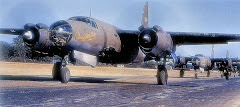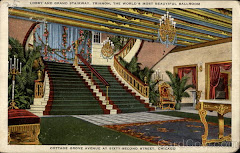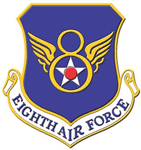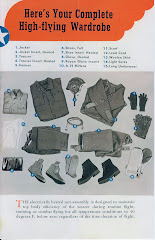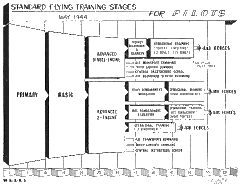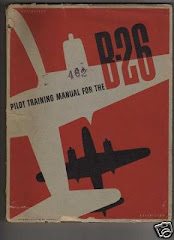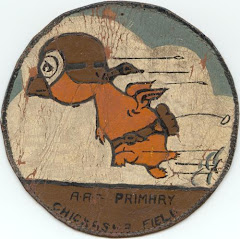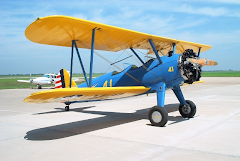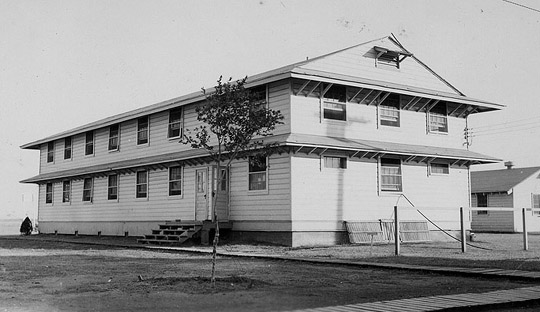I’m A Medic
Sometime in the fall of 1941 a team of recruiters from the Army Air Corps came by the base at Camp Barkeley asking for volunteers for Cadets for pilot training. I was first in line to volunteer. However, when I took the physical they dilated my eyes to the point I could hardly see, then I failed to pass the eye exam. Needless to say I was very disappointed and it was the first of many "mysteries" as to why the Army did what it did. It seemed pretty obvious that you couldn't take an accurate vision test if your pupils were dilated, so maybe you should take the vision exam first, then be dilated to check the eye itself. But what did I know, I wasn't a medic - yet.
So, it was back to my job as a typist at the hospital. Shortly however, I was “promoted” from being a typist to running the base dispensary! I would be giving new recruits their shots and hold daily sick call. Just the job I had tried to avoid for a year! I received a crash course in basic first aid, then advanced medical training. The dispensary consisted of a Captain who was in charge (he was also a Doctor), a Sergeant (me) and about six enlisted men.
One day we were supposed to give shots to about 200 soldiers at 0900 hours. The officers had marched the recruits over to the dispensary and lined them up outside the building. It was sunny and hot that day. We were not supposed to give shots without a Doctor being present. The Captain was late arriving. After about an hour with all of those soldiers standing in line outside in the hot sun, I decided we should start administering the shots. A short time later I heard the Captain come into his office, which was the room next to where we were working. About that same time a Major from the reception center barged into our room and said “I hear you’re giving shots without the presence of a Doctor.” I said, “No sir, the Captain is in the next room.”
Before too many weeks went by, the team of recruiters came around again asking for Cadet Volunteers. Again, I was first in line. This time I made sure they didn’t dilate my eyes during the physical. I passed the eye examination, as well as the physical, and was finally accepted into the Army Air Force Cadet program! It had been over a year since I first tried to get into pilot training at Randolph Field but it seemed like a lifetime.
Monday, December 29, 2008
Saturday, December 20, 2008
Chapter 6 Not A Medic, Please
A couple of days after our arrival at Fort Bliss an orderly came to our tent and asked if any of us could type. I said yes so they took me up to headquarters and gave me a typing test. Not too long after that I was reassigned to the Receiving Office of the Hospital at newly constructed Camp Barkeley, a few miles southwest of Abilene, Texas. So, even though I had refused to enlist in the medics at Randolph Field I wound up in the medics anyway. At least I was working a typewriter, not a hypodermic needle.
It was only two weeks after I was inducted at Fort Bliss, and events in Europe were looking grim. The famous Walter Winchell, whose radio commentaries included politics as well as celebrity gossip, was insisting America should enter the War – as were many other outspoken Americans. Daily radio broadcasts, both locally and nationally, told of the day’s war events in Europe. Even the National Farm and Home Hour, a popular radio broadcast in the Midwest, reported the progress of the war in Europe on every show. On May 27th, 1941 President Roosevelt went on the radio to announce that Germans had overrun Greece and Yugoslavia and invaded Crete. Europe was at War and it was beginning to look like America was going to eventually be drawn into the war. Getting ready for whatever would happen, Fort Bliss was busy training soldiers.
It was only two weeks after I was inducted at Fort Bliss, and events in Europe were looking grim. The famous Walter Winchell, whose radio commentaries included politics as well as celebrity gossip, was insisting America should enter the War – as were many other outspoken Americans. Daily radio broadcasts, both locally and nationally, told of the day’s war events in Europe. Even the National Farm and Home Hour, a popular radio broadcast in the Midwest, reported the progress of the war in Europe on every show. On May 27th, 1941 President Roosevelt went on the radio to announce that Germans had overrun Greece and Yugoslavia and invaded Crete. Europe was at War and it was beginning to look like America was going to eventually be drawn into the war. Getting ready for whatever would happen, Fort Bliss was busy training soldiers.
Saturday, December 13, 2008
Chapter 5 Joining the Army
For almost two years since I left Nebraska I’d worked different jobs, mostly hard labor. In March of 1941, I asked my brother to drive me the 35 or 40 miles into Fort Stockton in Pecos County Texas. I volunteered for the draft. The draft center put me on a bus to El Paso and I was finally inducted into the Army at Fort Bliss, on May 9, 1941.
I didn’t join the Army to “serve or defend my country” or to “fight for our freedom.” I’d spent about six years since graduating from high school eeking out an existence during the Depression and the years of drought. I’d been a dirt farmer and had worked from dawn to daylight, driving a tractor all day and most of the night, six days a week, sleeping on a cot at the end of the field I was farming. I’d worked on a cotton inspecting team following the harvest from South Texas to North Texas and into Arizona during the hottest, driest weather I’d ever experienced. I’d worked on a cattle ranch, waited tables at restaurants and stocked grocery shelves. I knew there was a better life out there and I wanted to use my brain, not my back. I’d spent a lot of time in farmland fields stopping to watch when a plane flew over. I’d dreamed of being a pilot and leaving dirt, dust and boll weevils far below in my own dust. When I joined the Army I wanted to be trained as a pilot. I wanted to get more education and be able to pursue a career. At the time, Europe was already under siege by Hitler but in America we had no notion that almost six months to the day from my induction into the Army Pearl Harbor would be attacked by Japan.
I didn’t join the Army to “serve or defend my country” or to “fight for our freedom.” I’d spent about six years since graduating from high school eeking out an existence during the Depression and the years of drought. I’d been a dirt farmer and had worked from dawn to daylight, driving a tractor all day and most of the night, six days a week, sleeping on a cot at the end of the field I was farming. I’d worked on a cotton inspecting team following the harvest from South Texas to North Texas and into Arizona during the hottest, driest weather I’d ever experienced. I’d worked on a cattle ranch, waited tables at restaurants and stocked grocery shelves. I knew there was a better life out there and I wanted to use my brain, not my back. I’d spent a lot of time in farmland fields stopping to watch when a plane flew over. I’d dreamed of being a pilot and leaving dirt, dust and boll weevils far below in my own dust. When I joined the Army I wanted to be trained as a pilot. I wanted to get more education and be able to pursue a career. At the time, Europe was already under siege by Hitler but in America we had no notion that almost six months to the day from my induction into the Army Pearl Harbor would be attacked by Japan.
Friday, December 5, 2008
Chapter 4 I'll Enlist If I can Be A Pilot
I first tried to enlist in the Army Air Corps at Randolph Air Force Base in Universal City, northeast of San Antonio, in late 1940. Randolph Field was a training base for pilots, so it seemed like the best place to go to enlist. When I got there I found out they were only accepting guys applying to be Mechanics or Medical personnel. Because I only wanted to be a pilot I decided not to enlist.
Two weeks later I reconsidered. I knew enough about fixing machinery that I decided to go back to Randolph and enlist as a mechanic. At least I’d learn how to fix airplanes and I thought that might be a good thing for a pilot to know. When I got there they didn’t need mechanics anymore. I still didn’t want to be a Medic, so again I didn’t enlist. The cotton season was over and jobs were hard to come by. I hitch-hiked to a small Texas town, Girvin, which was about 300 miles northwest of San Antonio. It was a couple of miles west of the Pecos river, where my oldest brother ran a nearby cattle ranch. I spent the winter as a cowboy helping him out on the ranch.
Two weeks later I reconsidered. I knew enough about fixing machinery that I decided to go back to Randolph and enlist as a mechanic. At least I’d learn how to fix airplanes and I thought that might be a good thing for a pilot to know. When I got there they didn’t need mechanics anymore. I still didn’t want to be a Medic, so again I didn’t enlist. The cotton season was over and jobs were hard to come by. I hitch-hiked to a small Texas town, Girvin, which was about 300 miles northwest of San Antonio. It was a couple of miles west of the Pecos river, where my oldest brother ran a nearby cattle ranch. I spent the winter as a cowboy helping him out on the ranch.
Tuesday, December 2, 2008
Chapter 3 Leaving Nebraska
I set out looking for something better to do with my life. I began by hitch-hiking to Uvalde, Texas. It’s a small town about 70 miles west of San Antonio on highway 90. I was heading there to visit one of my older brothers who was an engineer for the Illinois Pipe Line Company. He ran the pumping station in Uvalde.
I took odd jobs until that summer I was able to get a job with the government on a 3 man crew that inspected the cotton fields for boll weevils. The “inspector” ran the crew and did the paperwork. The second guy ran the inspection machine. I went around and picked up the samples from the cotton gins and fed them to the machine. When we finished one field, we went on to the next from South Texas to North, then into Arizona. It was hot, dry and hard work.
I took odd jobs until that summer I was able to get a job with the government on a 3 man crew that inspected the cotton fields for boll weevils. The “inspector” ran the crew and did the paperwork. The second guy ran the inspection machine. I went around and picked up the samples from the cotton gins and fed them to the machine. When we finished one field, we went on to the next from South Texas to North, then into Arizona. It was hot, dry and hard work.
Saturday, November 29, 2008
Chapter 2 Farming, Depression, Drought
I started my journey to becoming a pilot in February of 1939, long before I even knew there would be a war, much less a war so big and terrible that it involved almost all the world and would be fought in air, on land and sea. Roosevelt had been elected by a landslide (532 electoral votes out of 540) in ’36 and had a “New Deal” for putting America back to work. Thousands of people were working for the WPA (Work Projects Administration) programs and lucky to be making $60-75 a month.
At the end of the Nebraska growing season that year (’39), my dry farming partnership (during the big drought) with my younger brother had netted me slightly over $60 profit for the entire year and I owed about $500 on a pickup. My brother worked for McDonald’s Department Store, I did the farming. Like the old adage says: If your head hurts, quit banging it against the wall. We gave up farming and he sold off the machinery we had and used that money to pay off the pickup, then sold it. It was time to make a change.
At the end of the Nebraska growing season that year (’39), my dry farming partnership (during the big drought) with my younger brother had netted me slightly over $60 profit for the entire year and I owed about $500 on a pickup. My brother worked for McDonald’s Department Store, I did the farming. Like the old adage says: If your head hurts, quit banging it against the wall. We gave up farming and he sold off the machinery we had and used that money to pay off the pickup, then sold it. It was time to make a change.
Sunday, November 23, 2008
Chapter 1 - The Story of a World War II Pilot
This blog tells my story as a World War II pilot. I did live through some historic times which the Millennials and even the Gen Xers seem to know little about. Even our own children, the Baby Boomers, don’t understand why we went to war and even less about why we put it all behind us and just got on with life when, and if, we got back. We never told them, how could they understand? We’re guilty of not wanting to relive bad times or share them with our children. We were also under orders not to reveal details of our service. That's why so many of our stories have been a long time coming. For what it's worth here's my war history. I admit, I'm still leaving out a lot of details mostly because I've forgotten them.
My story is no that different than hundreds of other young men who went off to World War II but I’ve been told it had its interesting moments. Of course, there’s much more to our stories than the time we spent in the Armed Services (like how our families coped at home) but that’s mainly what I intend to tell here.
My story is no that different than hundreds of other young men who went off to World War II but I’ve been told it had its interesting moments. Of course, there’s much more to our stories than the time we spent in the Armed Services (like how our families coped at home) but that’s mainly what I intend to tell here.
Subscribe to:
Comments (Atom)



